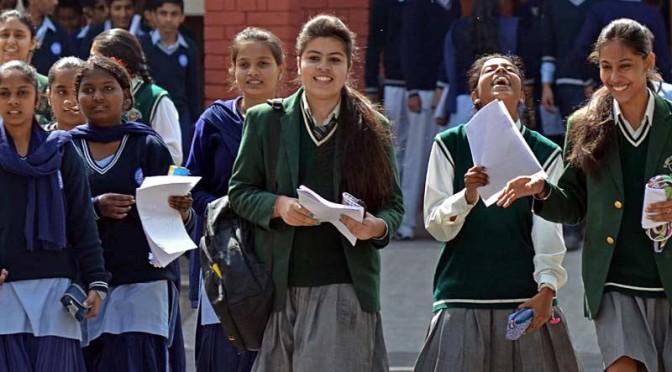
Cumulative Grade Point Average or CGPA was introduced by Central Board of Secondary Education (CBSE) in the year 2009 to evaluate the merit of students in standard 10. It is the average of the grade of the best five subjects out of the total 6. The Table below shows the respective grade for the CGPA.
| CGPA | GRADE |
| 8.0-10 | A+ |
| 7.0-7.99 | A |
| 6.0-6.99 | B+ |
| 5.5-5.99 | B |
| 4.5-5.49 | C+ |
| 4.0- 4.49 | C |
| 0-3.99 | F |
So basically, CGPA= sum of grade points of 5 subjects divided by 5.
For example (8+9+9+10+7)/5 = 43/5= 8.6
Now to obtain the percentage from the CGPA we multiply obtained CGPA by 9.4
Therefore, in the above case we will have 8.6*9.4 = 80.84 %
The main concept of CGPA was to remove the cut throat competition and hence give a breather to students who went into depression if they weren’t able to perform well. The declaration of result meant a no. of suicides making headlines. With the percentage system even a difference of 0.2 made huge difference in allotment of college. With the CGPA system the students don’t really get to know their real percentage of marks. A huge number of the population gets 10. There is an additional focus on the extra-curricular activities as there is point to that too. This system has scraped the competition.
The main purpose was to check the suicide rate of students subjected to immense pressure. The CGPA system might have reduced the immediate pressure but the root cause of suicide has not been checked. We have percentage system in standard 12 on the basis of which admission in country’s top rated college is administered. So just after 2 years the same viscous cycle begins again. The grade system is a hit with western countries like US where the ratio of student to teacher is well within proportion. Whereas in India the ratio of student to teacher is abysmal. This doesn’t allow for the proper evaluation of a child’s true merit. It’s a common practice in most of the schools in India to give grades irrespective of the performance of the student. So the CGPA system fails in the assessment of caliber. Then students can never know their true result. It’s discouraging for students who put in hard effort and do not get to know the fruit of their determined effort. Moreover, since a large number of students get more or less similar grade there is again a huge competition for admission in top schools. And as seats are limited many with the same grade do not get into the top school which is again downright unfair.
CGPA system has its merits but its demerits hugely overweigh over them. It is far from an ideal evaluating system.
Featured Image Source:financialexpress